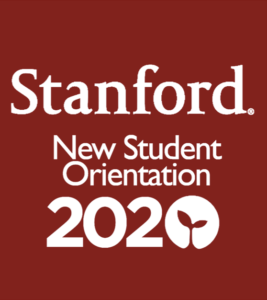New Student Orientation goes virtual
 New Student Orientation (NSO), the often exuberant and always engaging series of events designed to introduce new students to the academic, cultural and social life at the Farm, has gone virtual this year.
New Student Orientation (NSO), the often exuberant and always engaging series of events designed to introduce new students to the academic, cultural and social life at the Farm, has gone virtual this year.
This year’s events, scheduled from Sept. 9 to 12, are occurring exclusively online, including for the small number of undergraduates whose special circumstances have resulted in permission to live on campus during the COVID-19 pandemic. Those students are being housed in Escondido Village Graduate Residences under the guidance of Student Affairs community directors.
Edith Wu, associate dean and director of New Student Programs, said the university’s August decision to forgo plans to house some undergraduates on campus during autumn quarter and instead to focus on remote learning caused significant changes in NSO events.
“Early on, we knew New Student Orientation had to be virtual because of social distancing regulations,” Wu said. “There was no way we were going to pack Memorial Auditorium with new students. We have always assumed that the NSO experience was going to have to be virtual. But we imagined that students would be on campus experiencing NSO together in community.”
Given the restrictions caused by COVID-19, Wu, her staff and the six student orientation coordinators concentrated on how to infuse online events with the same excitement that has traditionally characterized NSO.
“We knew that our activities would be experienced by students on their own and located all over the world and in different time zones,” she said. “Plus, we are aware that many of our students have family responsibilities at home. So, we have been thinking about how they can feel connected and have a sense of belonging while respecting that their circumstances may be quite challenging and that we won’t have their full attention.”
Wu said she and her staff pared down the NSO schedule, concentrating on events considered most crucial to creating connections and an understanding of Stanford’s expectations and opportunities.
Those efforts required less of a pivot from previous years and more of a sidestep. That’s because the university’s programming for new students – called Approaching Stanford – actually begins as soon as students are admitted and involves everything from placement tests to filling out health forms to taking required courses on alcohol education and the Honor Code.
With that foundation already laid, Wu said she and her staff were able to focus on events that can only occur during New Student Orientation, including Faces of Community, which stresses the rich and broad diversity of the Stanford student body.
Another mainstay of NSO, Discover Stanford – which generally addresses the purpose of a liberal education – was reimagined for a virtual audience with a discussion and question and answer session with President Tessier-Lavigne and Provost Persis Drell.
The popular Three Books Discussion, Stanford’s signature common reading program for first-year students, gave students the opportunity to interact with Angela Duckworth, author of Grit, and Bettina Love, who delivered the TED Talk “Hip hop grit and academic success.” Three Books includes a series of readings and videos on the theme Education and Culture. Rather than culminating during NSO, as in past years, Three Books will continue as a discussion series into the academic year. Ta-Nehisi Coates, author of Between the World and Me, will join students for a conversation on Oct. 2.
On the last day of NSO, Saturday, Sept. 12, Drell welcomed parents, guardians and families to an event featuring Student Affairs staff offering advice about supporting students through this year.
It’s the “small touches” of NSO that Wu hopes will convey the Stanford experience to new students. Wu said she is grateful to the many members of the university community who have contributed to reimagining NSO in light of limitations created by COVID-19.
“We know that, ultimately, it is the folks who are contributing who will provide that sense of warmth that characterizes Stanford,” she said.
